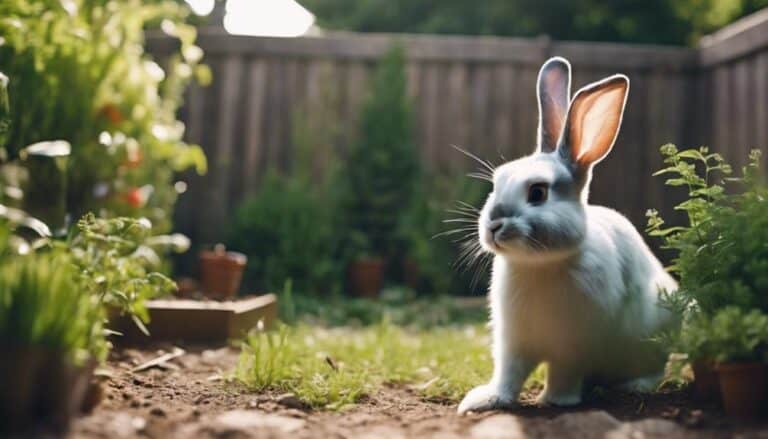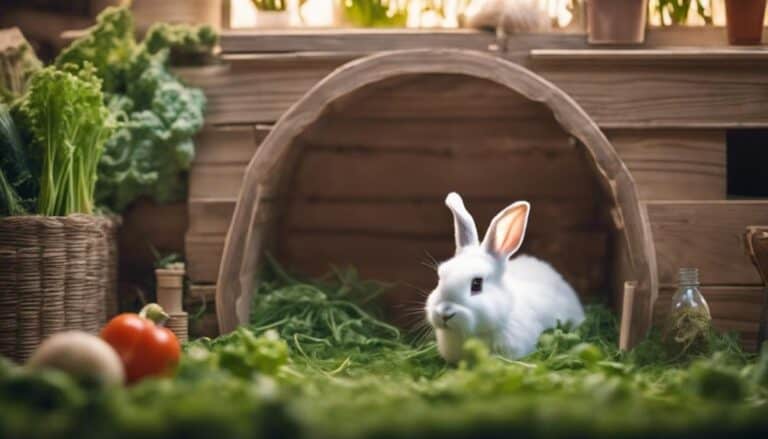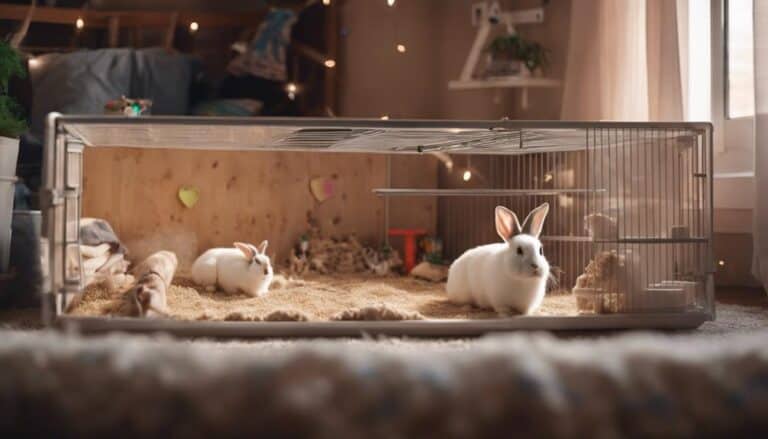You might think that creating a haven for your bunnies with the right plants could be a challenging task, with so many options to ponder. However, by focusing on the top plant picks that align with your furry friends' needs, you can effortlessly transform their space into a paradise of nibbling delights.
From nutritious greens to vibrant blossoms, each plant serves a specific purpose in enhancing your bunny's environment. Discover the ideal plant selections that will not only cater to your bunnies' well-being but also add beauty to their habitat.
Contents
- 1 Key Takeaways
- 2 Bunny-Friendly Plant Selection Tips
- 3 Sun-Loving Plants for Bunny Gardens
- 4 Shade-Tolerant Plant Varieties for Bunnies
- 5 Low-Maintenance Plants Perfect for Bunnies
- 6 Flowering Plants to Brighten Bunny Habitats
- 7 Herbaceous Plants for Bunny Nibbling
- 8 Frequently Asked Questions
- 9 What are the Best Plants to Include in a Bunny Haven for Agile Bunny Breeds?
- 10 Conclusion
Key Takeaways
- Opt for bunny-friendly plants like clover, violets, and herbs to create a welcoming environment for rabbits.
- Choose sun-loving plants such as sunflowers and lavender to provide both sustenance and beauty in the bunny garden.
- Incorporate shade-tolerant varieties like hostas and ferns to offer rabbits cool and sheltered spots for relaxation.
- Include nutritious herbaceous plants like dandelion and timothy grass to meet the dietary needs of bunnies in their haven.
Bunny-Friendly Plant Selection Tips
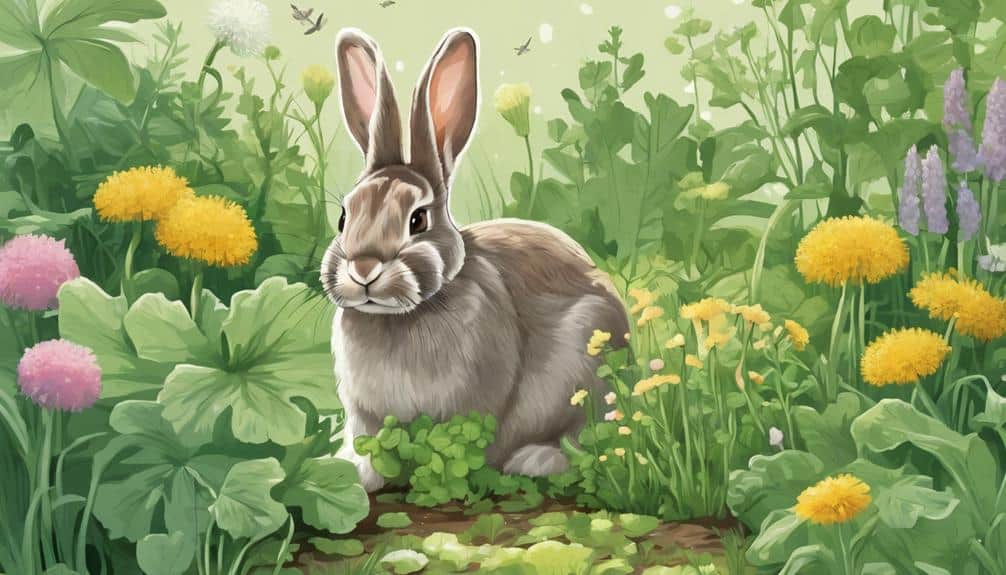
When selecting plants for a bunny-friendly garden, it's essential to choose species that rabbits tend to avoid to minimize damage to your green space. Wild rabbits have specific preferences, and by strategically planting certain species, you can create a garden that's less appealing to them.
Opt for plants like clover, violets, lambs ears, herbs, allium, cleome, Russian sage, and rudbeckia, as these are known to be less enticing to rabbits. By incorporating these rabbit-resistant plants around your garden, you provide cover and a diverse range of options that will deter wild rabbits from feasting on your more susceptible plants.
Clover and violets, for example, can act as distractions, drawing rabbits away from other more attractive options in your garden. By creating a mix of plants that rabbits tend to avoid, you cultivate an environment that's less inviting to these furry intruders, ultimately minimizing the damage they may cause.
Sun-Loving Plants for Bunny Gardens
Sun-loving plants for bunny gardens thrive in full sunlight, flourishing under ideal conditions for growth and nutrition. These plants, such as sunflowers, marigolds, zinnias, and lavender, not only add beauty to the garden but also offer rabbits a variety of edible options to enjoy.
Choosing sun-loving flora guarantees a vibrant and enticing environment where bunnies can graze and benefit from both visual appeal and dietary diversity.
Ideal Plants for Sunlight
To create a thriving bunny garden that basks in sunlight, incorporating sun-loving plants like lavender, rosemary, and marigolds is essential. These plants require at least 6-8 hours of direct sunlight per day to flourish and provide a vibrant environment for your rabbits.
Here are some ideal plants for sunlight:
- Lavender: Adds a lovely fragrance to the garden and attracts pollinators, creating a dynamic ecosystem for your bunnies.
- Rosemary: With its aromatic leaves, serves as a natural insect repellent, keeping pests away from your bunny haven.
- Marigolds: Brighten up the garden with vibrant blooms and help deter pests like nematodes, creating a healthier environment for your rabbits.
Incorporating these sun-loving plants won't only beautify your garden but also enhance the well-being of your bunny companions.
Thriving Under Sunny Conditions
Incorporating a diverse selection of sun-loving plants into your bunny garden not only adds vibrancy and fragrance but also attracts beneficial pollinators, creating a dynamic ecosystem for your rabbits.
Sun-loving plants such as marigolds, zinnias, and lavender thrive in sunny bunny gardens, offering vivid colors and enticing scents. These plants, along with rabbit-friendly herbs like parsley, cilantro, and basil, provide both visual appeal and culinary benefits.
Succulents such as sedum and hens-and-chicks, which are drought-tolerant, add texture and visual interest to sunny spots in your garden. Sunflowers, with their striking appearance and seeds that rabbits love, not only serve as a focal point but also offer a nutritious treat for your furry friends.
Shade-Tolerant Plant Varieties for Bunnies

Shade-tolerant plant varieties offer bunnies a cool and sheltered environment for relaxation.
Hostas, ferns, and coral bells create ideal spots for rabbits to rest peacefully.
Incorporating these plants guarantees a lush and inviting bunny haven in shaded areas.
Leafy Greens Options
Shady areas can still provide a nutritious buffet for your bunny with the right leafy greens options. When choosing plants for your bunny's habitat, consider these shade-tolerant leafy greens:
- Kale: Rich in vitamins A, C, and K, kale is a robust leafy green that thrives in low light conditions.
- Swiss Chard: With its colorful stems and nutrient-dense leaves, Swiss chard offers a variety of essential minerals for your bunny's diet.
- Arugula: This peppery green not only adds flavor but also packs a punch of antioxidants and phytonutrients.
- Spinach: A classic choice, spinach is a leafy green that bunnies love for its tender leaves and high iron content.
These leafy greens will make sure your bunny gets a balanced diet even in shaded environments.
Safe Herbs Choices
For a well-rounded diet in shaded environments, consider introducing shade-tolerant herb choices like parsley, cilantro, mint, lemon balm, and thyme to your bunny's habitat. These shade-tolerant herbs provide essential nutrients for your eastern cottontail and add variety to their diet.
Parsley, abundant in vitamins A and C, is highly favored by rabbits and thrives in partial shade conditions. Mint, a robust herb, can flourish in shady spots, offering an invigorating taste for your bunny to relish.
Lemon balm and thyme, both aromatic herbs, can be cultivated in shaded areas, enriching your rabbit's diet with different flavors and scents. By incorporating these shade-tolerant herbs into your bunny's environment, you can make certain they receive a diverse array of essential nutrients to support their well-being.
Low-Maintenance Plants Perfect for Bunnies
Opt for low-maintenance plants like clover, timothy grass, and chicory to effortlessly enhance your bunny's habitat with essential nutrients and fiber. These plants not only provide a source of nutrition but also require minimal effort to thrive, making them ideal for busy bunny owners.
Here are four reasons why these plants are perfect for your furry friends:
- Nutrient-Rich: Clover is a favorite among rabbits due to its high nutrient content, offering a diverse range of vitamins and minerals important for their well-being.
- Digestive Health: Timothy grass, a staple in rabbit diets, promotes healthy digestion by providing essential fiber that aids in maintaining a balanced gut flora.
- Flavorful Delight: Chicory, a nutrient-dense plant, is loved by rabbits for its taste and also contributes to their overall health by offering a variety of beneficial compounds.
- Low Maintenance: These plants are easy to grow and require minimal care, ensuring that you can effortlessly provide your bunnies with a thriving and enriching environment.
Flowering Plants to Brighten Bunny Habitats
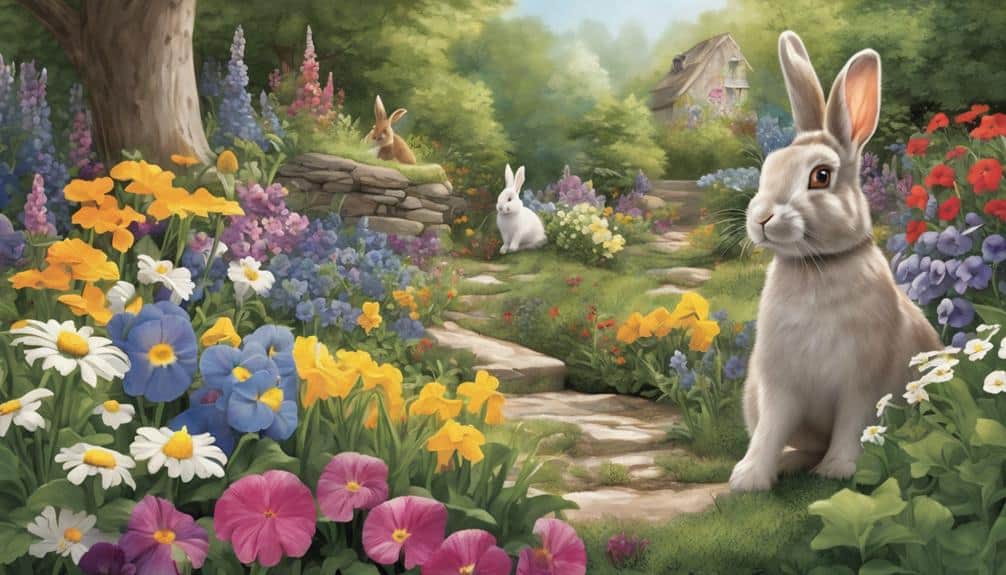
Brighten your bunny habitat with a variety of flowering plants that not only add visual appeal but also provide valuable resources for your furry friends.
Planting bee balm will attract pollinators while adding vibrant colors to the landscape. Coneflowers are an excellent choice as they offer a pop of purple and serve as a food source for rabbits in the garden.
Daylilies, with their burst of orange hues, are low-maintenance options that bring beauty to bunny-friendly gardens. Black-eyed Susans, with their profuse blooms and drought guarantee, enhance the visual appeal of the rabbit haven.
Additionally, consider incorporating Coreopsis varieties that bring bright yellows and reds to the landscape while attracting beneficial insects to the area.
Herbaceous Plants for Bunny Nibbling
Herbaceous plants like clover, alfalfa, and chicory play an important role in providing essential nutrition for rabbits due to their high fiber content. Rabbits rely on a varied diet to thrive, and herbaceous plants offer a range of nutrients that contribute to their overall well-being.
Here are some herbaceous plants that can enhance your bunny's diet and provide enriching foraging opportunities:
- Lambs Quarters: Rich in vitamins and minerals, lambs quarters are a favorite among rabbits for their tender leaves and stems.
- Dandelion: A common backyard herb, dandelions aren't just weeds but also a nutritious snack for rabbits, packed with essential nutrients.
- Timothy Grass: Known for its high fiber content, Timothy grass aids in digestion and helps wear down rabbits' teeth, promoting dental health.
- Jerusalem Artichoke Tops: Offering a crunchy texture, Jerusalem artichoke tops provide rabbits with a stimulating foraging experience while supplying essential nutrients like potassium.
Including these herbaceous plants in your bunny's habitat can't only satisfy their dietary needs but also offer them engaging foraging opportunities for mental stimulation and physical health.
Frequently Asked Questions
What Plants Do Rabbits Hate the Most?
Rabbits hate plants with strong scents like rosemary, mint, and lavender. Toxic species like daffodils, foxgloves, and monkshood repel them. Fuzzy or prickly textures of lamb's ears, cleome, and Russian sage deter rabbits. Alliums like onions, garlic, and chives emit odors disliked by rabbits.
How High Should a Raised Garden Bed Be to Keep Out Rabbits?
To effectively keep out rabbits, raised garden beds should be at least 2 feet high. Taller beds, around 3 feet, provide an extra barrier. These heights deter rabbits from accessing and damaging plants, ensuring a bunny-free haven.
What Can I Put on My Plants to Keep Rabbits From Eating Them?
To keep rabbits from eating your plants, try using repellent sprays with scents like garlic or pepper, installing barriers like chicken wire, and creating diversionary feeding areas with rabbit-resistant species. These methods can help protect your garden.
How Do You Make a Rabbit Proof Vegetable Garden?
To make a rabbit-proof vegetable garden, start by installing fences with 1/4- or 1/2-inch mesh at least 2 feet high. Bury edges 6 inches deep and maintain a 2-inch gap from plants. Utilize natural deterrents, companion planting, and proper fencing options for effective protection.
What are the Best Plants to Include in a Bunny Haven for Agile Bunny Breeds?
When creating a bunny haven for top agile bunny breeds, consider including plants like cilantro, mint, and basil. These aromatic herbs not only provide a safe and enjoyable environment for your bunnies but also offer a tasty and nutritious snack for them to nibble on.
Conclusion
To sum up, selecting the right plants for a bunny haven is vital for their dietary and environmental needs. Did you know that rabbits can consume up to 30% of their body weight in food each day?
By choosing a variety of bunny-friendly plants like Jerusalem Artichoke tops, clover, and orchard grass, you can create a balanced and enriching environment for your furry friends. Remember to provide a mix of fodder, protein sources, and medicinal plants to keep your rabbits happy and healthy.

